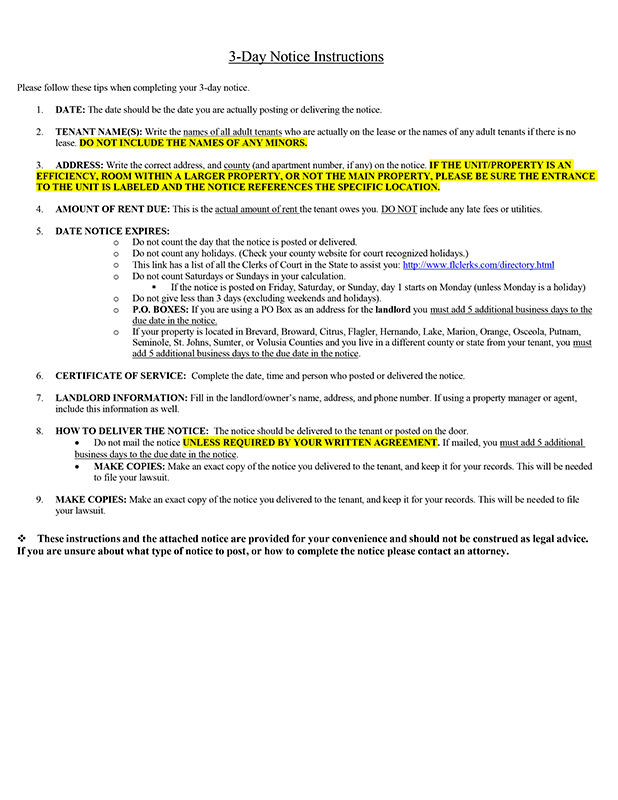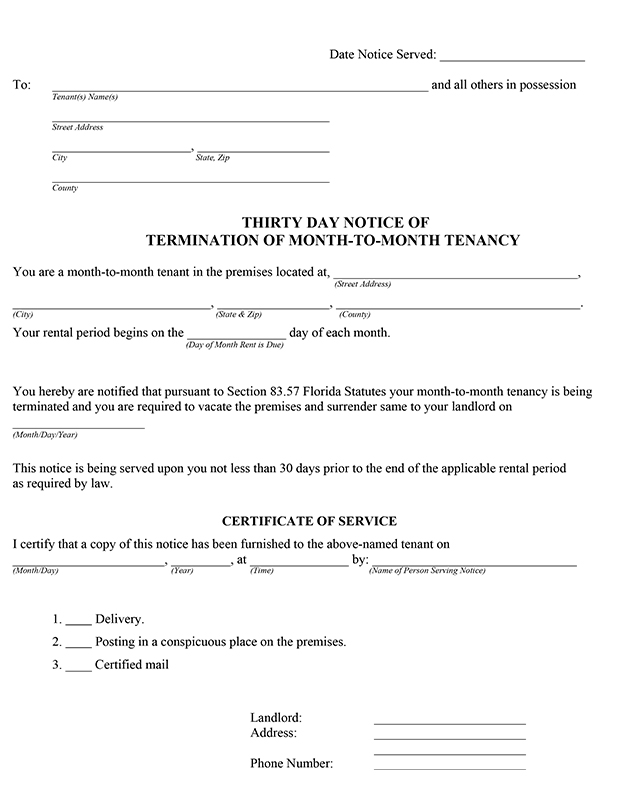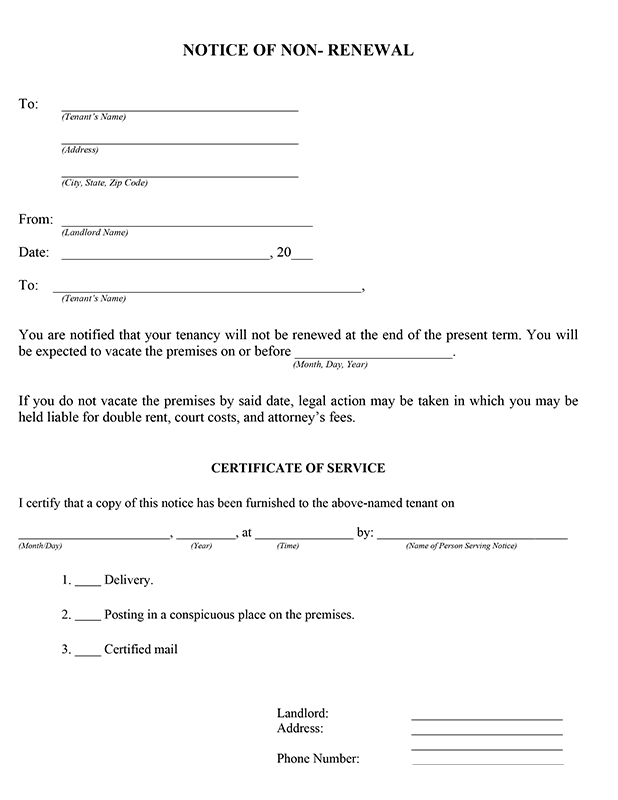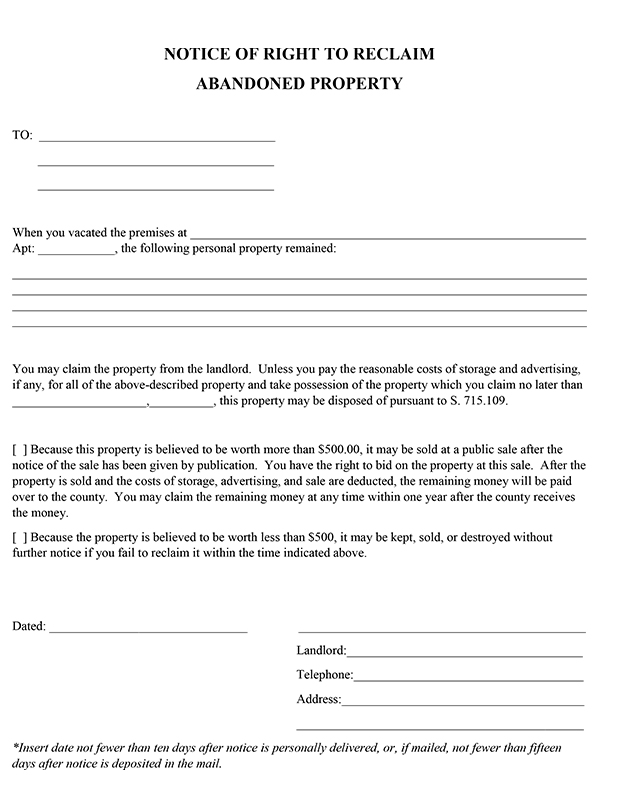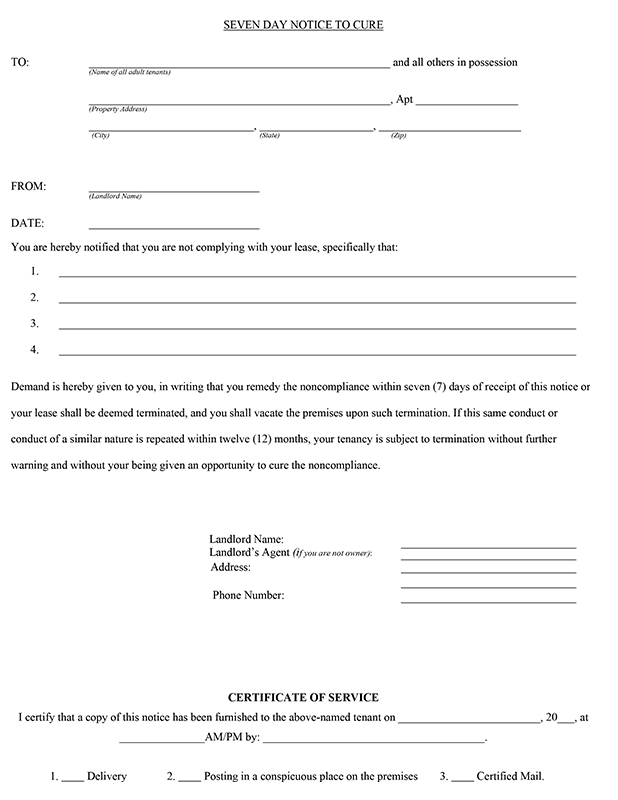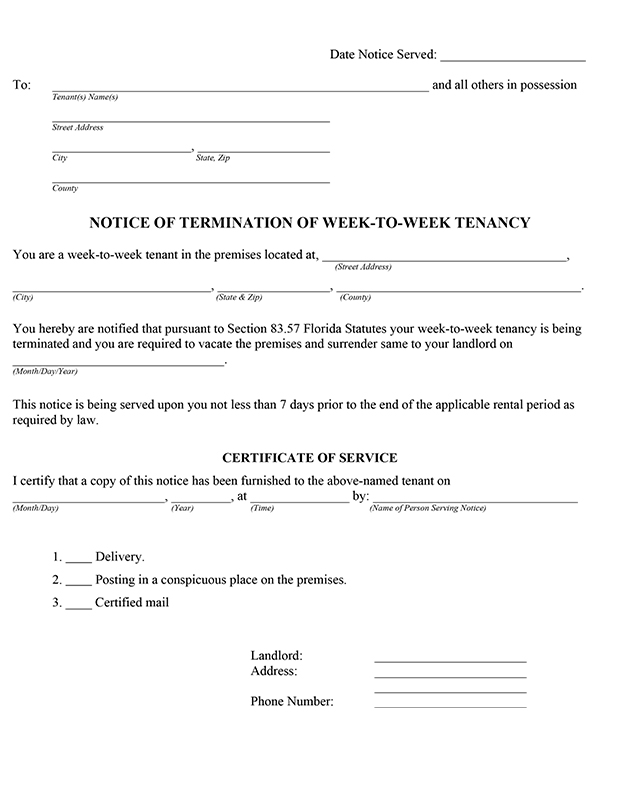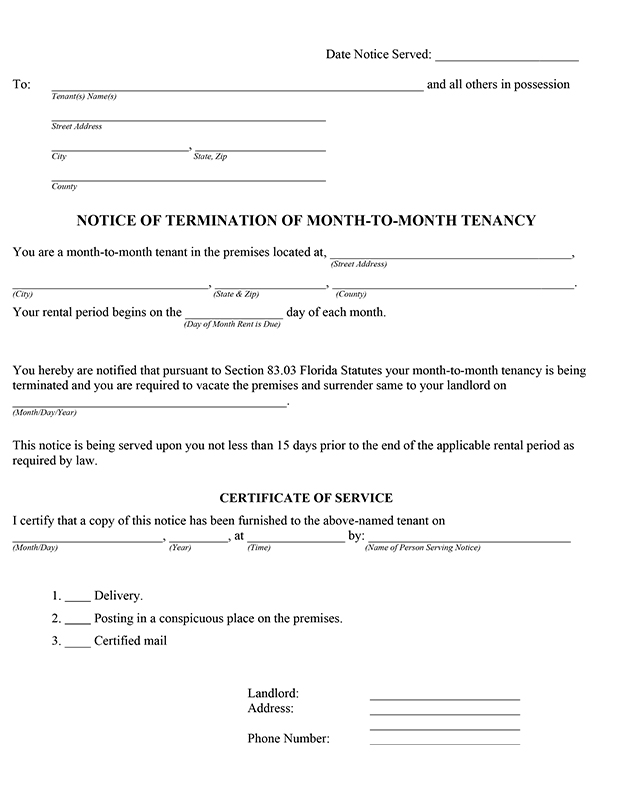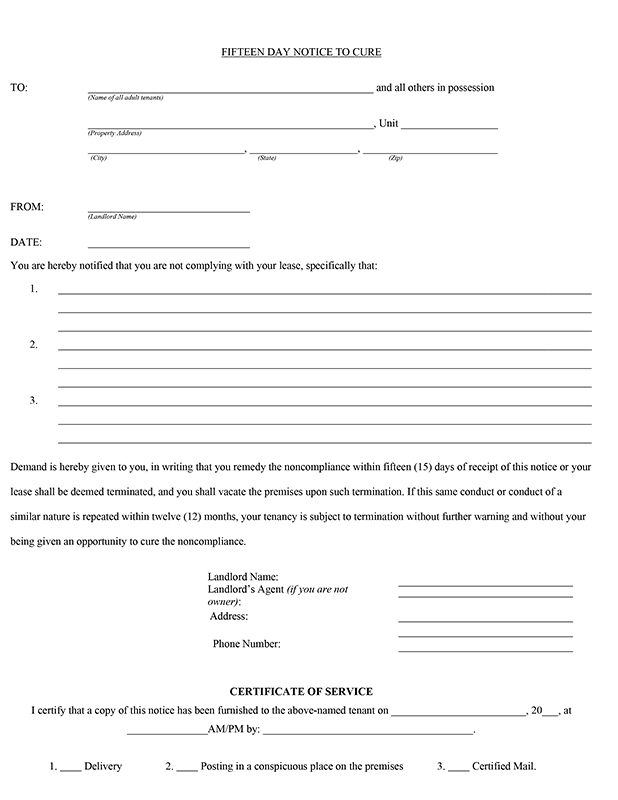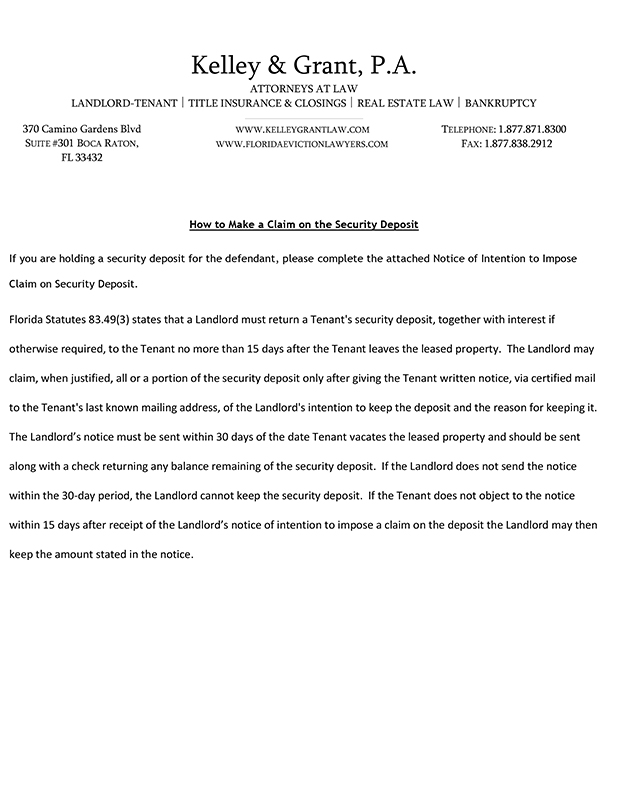Florida Eviction Notices
Forms
Forms
PDF Forms
3-Day Notice for Non-Payment of Rent with Instructions
Termination of Month to Month Tenancy
Notice of Non-Renewal of Lease
Notice of Right to Reclaim Abandoned Property
Under Florida statutes, if a landlord files for eviction in Florida and receives a Final Judgment and executes a writ of possession, the landlord can move all of the remaining belongings of the tenant out to the property line and be insulated from liability for any damage and loss to the tenant’s belongings. However, if a tenant vacates prior to a Final Judgment and writ of possession being issued, and the tenant leaves behind belongings the landlord should serve the tenant with this notice prior to disposing of any abandoned property.
Seven Day Notice to Cure Tenant Violations
Termination of Week to Week Tenancy
Commercial Termination of Month to Month Tenancy
This notice is used if there is no commercial lease in place in Florida. You should consult an expired lease, if there is one, before serving this notice to determine if there are any additional requirements for service or time frames. This notice must be served at least 15 days prior to the beginning of a new monthly rental period. Once your notice expires, if the tenant has not vacated you can contact us to begin your Florida commercial eviction.
Fifteen Day Notice to Cure for Commercial Tenant Violations
Notice of Intent to Retain Security Deposit
Court Information and Forms
Clerk Directory is a useful resource. It has a list of all the Clerks in all 67 counties in Florida. It might take a bit of searching at your county Clerk website, but you should be able to find self-help forms, eviction notices, and information for filing evictions in your county.
Landlord Tenant Forms, provided by the Florida Bar, is another invaluable resource for the Do It Yourself landlord. In addition to providing Florida leases, it provides Landlord Tenant Eviction Forms, including notices and legal documents for filing a complaint for eviction, and ultimately obtaining a writ of possession for tenant removal. Landlords can download all the necessary documents for free at the Florida Bar website.
Online Forms
Start an Eviction by Completing our Intake Package
If you are ready to start the eviction process, please complete this form in its entirety. Once submitted, Kelley & Grant, P.A. will review the information and contact you to advise of next steps.
Start a New Lease
Complete our lease intake form and we will review your information and send you an attorney drafted lease.
Title Forms
To order title work and title insurance, use our online order form.
Unlawful Detainer Eviction Package
If you are ready to begin an unlawful detainer action against an unlawful occupant in your property who is not a tenant, does not have a lease, and who has never paid rent then you can complete this intake package. We will begin the unlawful detainer eviction process in court after serving a 5 day notice to vacate on the unlawful occupants.
FORMS FOR EACH STAGE OF EVICTION CASE
Below are the steps in a typical uncontested eviction case and the appropriate court forms for each step. Keep in mind that you should always consult with an attorney and consider utilizing one for your eviction or else your case could result in serious delays or sometimes dismissal if you make an error in one of the steps in the process.
Deliver Written Notice
The first step in an eviction in Florida is to serve a notice to the tenant prior to filing anything in court. If the issue is nonpayment of rent, the landlord is required to serve a 3-day notice. The three methods of service of an eviction notice on a tenant are service by hand delivery, by certified mail, or by posting it on the door of the rental property. For other types of terminations of tenancy the landlord should utilize the correct notice such as a 7 day notice to cure for a lease violation, or a 30 day notice of termination for a month to month tenancy. Any mistake on these statutory notices could result in your eviction court case being dismissed or delayed. You can find a variety of notices in the resources above.
File Eviction in County Court
When a landlord’s notice has expired the next step is to file an eviction complaint with the county court in the county in which the property is located. You can find a sample eviction complaint here. The landlord must file the eviction complaint with the county court and pay the necessary filing and service fees.
Serve Tenant with 5-Day Summons
Once the complaint is filed, the next step in the eviction process in Florida is that the court will issue a summons to the tenant. Many clerks of court require that the landlord also supply a summons to the court so that they can issue it. You can see a sample summons here. The landlord can either utilize a sheriff or a process server to serve the summons and complaint on the tenant. A process server is usually quicker than the local sheriff. A process server will serve the summons to the tenant via personal service, posting on the tenant’s door, or via substitute service. The summons will inform the tenant of the time frame in which they must respond to the complaint. The landlord cannot move the eviction case forward or file for default during this 5 business day grace period and the tenant can utilize this time to either hire an attorney or file a responsive pleading with the court.
Motion for Default
If the tenant does not respond to the summons within the 5 business day period, the landlord’s next step is to file a motion for clerk’s default with the court and this form can be found here. This motion requests that the county clerk enter a clerk’s default for the tenant having failed to respond to the eviction complaint and summons. Additionally a clerk’s default is a prerequisite for the court to enter a judgment in favor of the landlord when a tenant has not defended themselves in the eviction case.
Submit Final Judgment
Once the clerk of court enters their default onto the court docket, the landlord should then submit a proposed final judgment for eviction to the court. A sample final judgment for possession is located here. The language in the final judgment will order the tenant to vacate the property. It also authorizes the clerk of court to issue a writ of possession, and for the sheriff to serve the writ of possession on the premises and evict the tenant.
Writ of Possession
Once the final judgment is entered, the final step of the eviction process in Florida is that the landlord can obtain a writ of possession from the clerk of courts for an additional fee which is usually $90. Along with the check to the clerk of court you should also submit a sheriff’s information sheet. A sample information sheet is located here.
There are many pitfalls which you may experience by filing your own eviction. Before doing so you should consult with an attorney to discuss your options and determine whether you should retain an attorney. Feel free to contact our office today at 1(877) 871-8300 to get more information on serving an eviction notice or filing an eviction.
Contact Us Today!
Fill out the form below and we will be in touch with you as soon as possible.
Recent Posts
- Association Planning Calendar 2026
- Commercial Lease Disputes in West Palm Beach: Tenant Rights and Landlord Remedies
- Estate Planning for West Palm Beach Retirees: Avoiding Probate in Palm Beach County
- Converting West Palm Beach Properties to Short-Term Rentals: Legal Requirements and Restrictions
- West Palm Beach Lease Agreement Essentials: What Landlords Must Include in 2026
Call Us!
Contact Us today to see how we can help.

